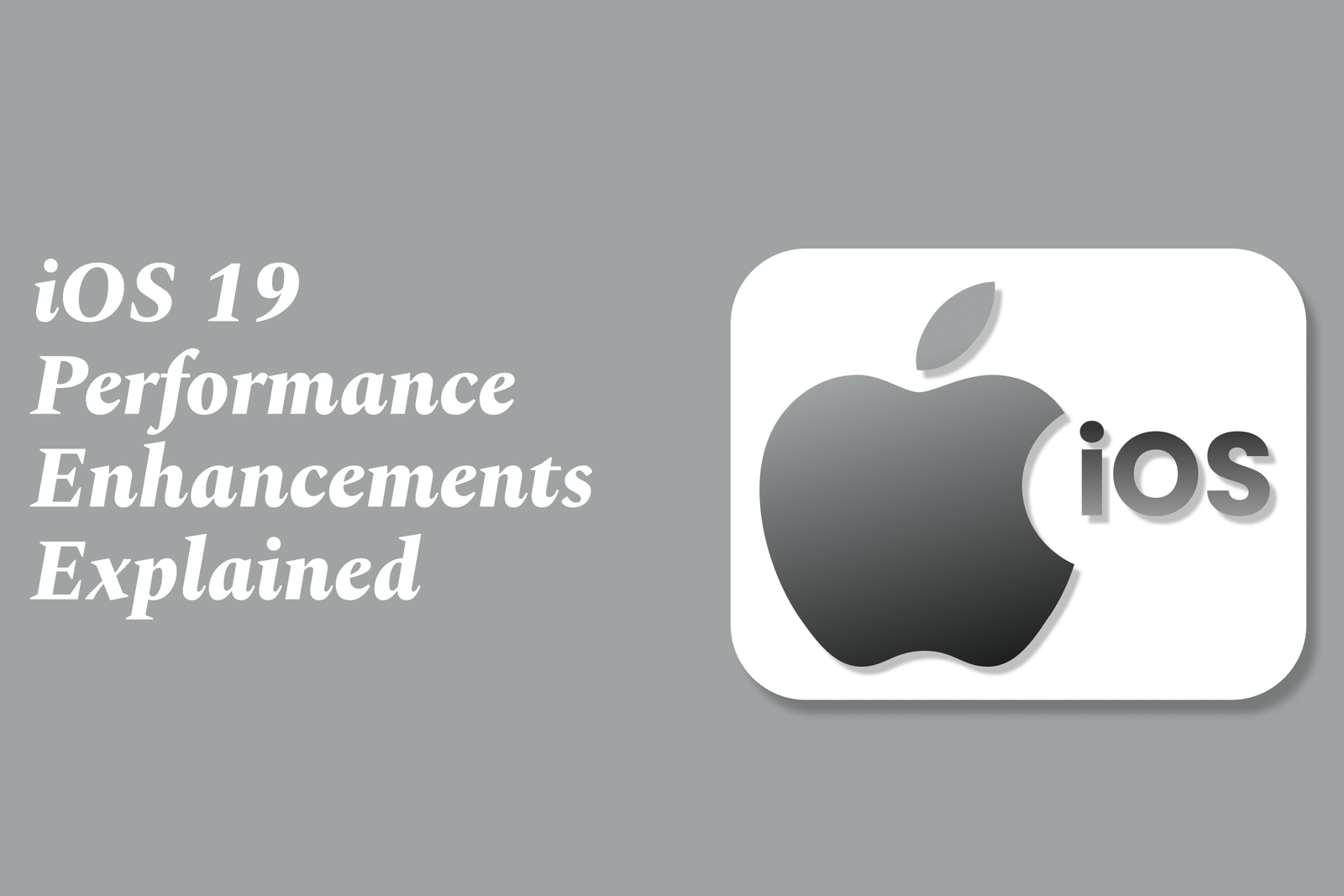iOS 19 performance enhancements explained
iOS 19 brings key performance enhancements focusing on faster system responsiveness, improved graphics rendering, smarter battery management, and refined UI clarity. These updates ensure smoother animations, better stability, and longer battery life across supported Apple devices.
iOS 19 Performance Enhancements Explained
1 ) Overview of iOS 19 Updates
Apple’s iOS 19 brings a series of performance enhancements aimed at refining user experience. These improvements focus on system efficiency, speed, and battery optimization without sacrificing visual appeal or functionality.
2 ) Graphics and GPU Optimization
The update includes advanced real time rendering techniques that enhance graphics fluidity, improving interface animations and app responsiveness. Although some rendering effects are visually rich, Apple has optimized GPU usage to maintain smooth performance and prevent lag, particularly noticeable in high demand scenarios.
3 ) Battery Life Improvements
iOS 19 introduces smarter power management that dynamically adjusts resource allocation based on user activity and app usage. This leads to better battery endurance, even when running graphics intensive processes or multiple applications simultaneously.
4 ) User Interface Refinements
Despite adding visually ambitious features such as the “Liquid Glass” aesthetic introduced in prior versions, iOS 19 fine tunes legibility and contrast under various lighting conditions. Accessibility settings are enhanced to adapt automatically, improving display clarity both indoors and outdoors.
5 ) System Stability and Bug Fixes
The update addresses various bugs and performance issues reported in earlier versions. Fixes ensure smoother operation across supported devices, reducing crashes, freezes, and unresponsiveness during everyday tasks.
6 ) Enhanced Web Experience
Safari and web based applications benefit from transparent design elements and optimized rendering, contributing to a visually appealing and faster browsing experience without excessive battery drain.
7 ) Compatibility and Support
iOS 19 continues to support a wide range of Apple hardware, ensuring performance enhancements benefit both new and older device models while maintaining overall system stability.
8 ) Conclusion
iOS 19 represents a balanced upgrade emphasizing performance enhancements, aesthetic improvements, and power efficiency. Users can expect smoother animations, longer battery life, and a visually adaptive interface that responds well in diverse environments.
https://justacademy.in/news-detail/react-native?s-new-live-reload-vs-fast-refresh-showdown
https://justacademy.in/news-detail/android-system-diagnostics-tools
https://justacademy.in/news-detail/react-native?s-new-push-notification-features-you-must-try
https://justacademy.in/news-detail/android-apps-integrating-blockchain
https://justacademy.in/news-detail/how-react-native-helps-build-high-performance-apps
Related Posts
Java supports GDPR and data privacy by enabling secure data handling through encryption, controlled access, and precise data management. It allows developers to minimize PII exposure, ensure data confidentiality, and design workflows that comply with data protection regulations effectively.
Java code quality tools have evolved to include advanced static analysis, integrated security checks, and AI-powered code reviews. These updates help developers detect bugs, enforce coding standards, and enhance security, streamlining the development process and improving overall code reliability.
Java remains a cornerstone in big tech companies, evolving with modern features like records, pattern matching, and virtual threads. Its robust ecosystem, enhanced performance, and growing AI integrations keep it vital for both legacy systems and innovative new projects.
Java and CI/CD pipeline optimizations streamline Java application development by automating builds, tests, and deployments. They improve efficiency through parallelization, caching, and secure secrets management, enabling faster feedback loops and more reliable, scalable software delivery.
Java supports modern cryptography standards through its flexible Java Cryptography Architecture (JCA), enabling integration of advanced algorithms like AES, EdDSA, and post-quantum tools. Libraries like Bouncy Castle offer FIPS-certified, hardware-accelerated implementations for secure development.
Java 23 enhances record patterns by enabling concise, direct destructuring of record components within pattern matching, simplifying type checks and data extraction. This improvement boosts code readability and expressiveness by reducing boilerplate in handling immutable data classes.
Java remains a top choice for mobile app backends, powering scalable, secure, and high-performance server-side solutions. Latest trends include cloud-native microservices, reactive programming, and enhanced JVM optimizations, enabling efficient, flexible, and robust mobile backend development.
Java SE 24 and LTS Java SE 21 offer enhanced features and performance, while Apache Spark 4.0.0 introduces Scala 2.13 support and advanced ML and SQL capabilities. Together, they empower developers to build scalable, high-performance data applications with modern tools.
JUnit 5 modernizes Java testing with a modular architecture, improved assertions, and seamless Java 8+ support. Beyond JUnit, tools like Mockito and AssertJ enhance mocking and assertions, creating a powerful, flexible ecosystem for writing clean, efficient Java unit tests.
Java plays a pivotal role in cloud automation tools by providing a robust, platform-independent language used to build scalable automation frameworks like Jenkins and Selenium, enabling efficient CI/CD pipelines, testing, and orchestration across diverse cloud environments.










